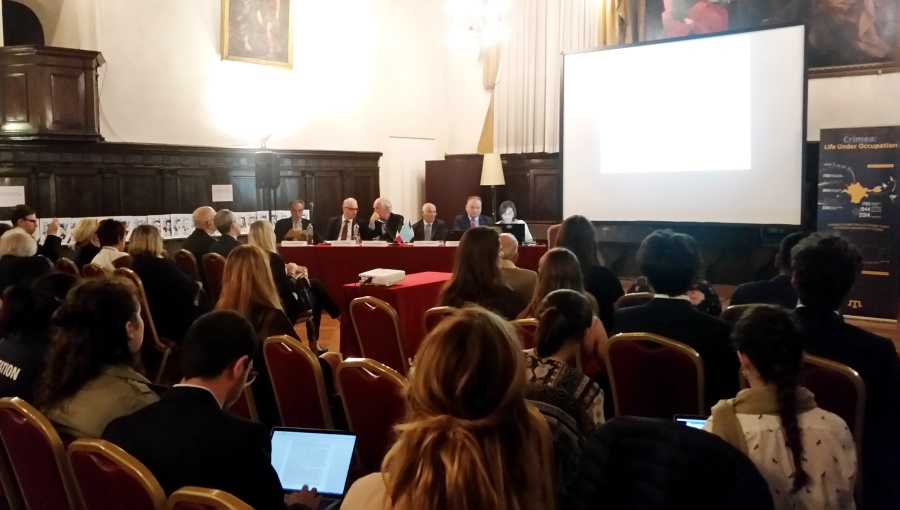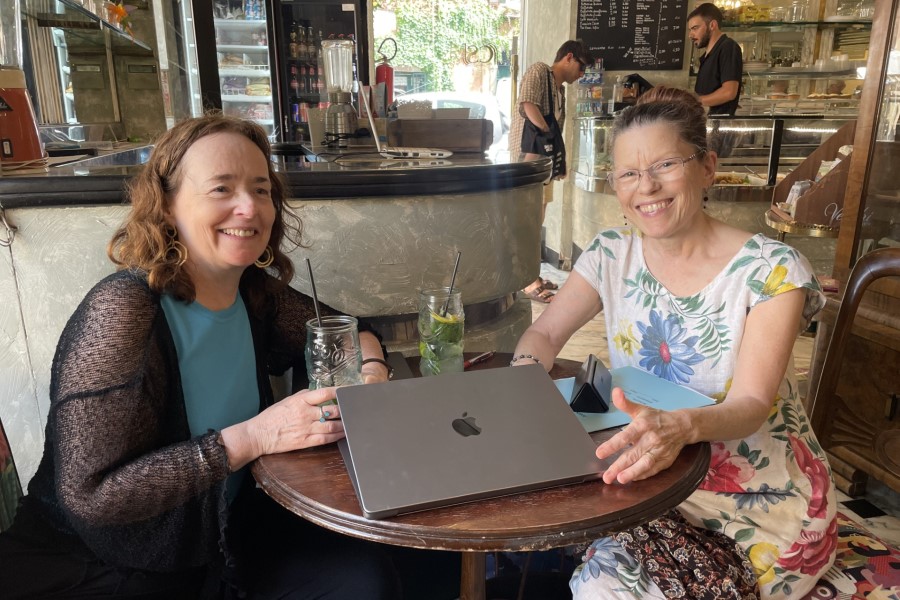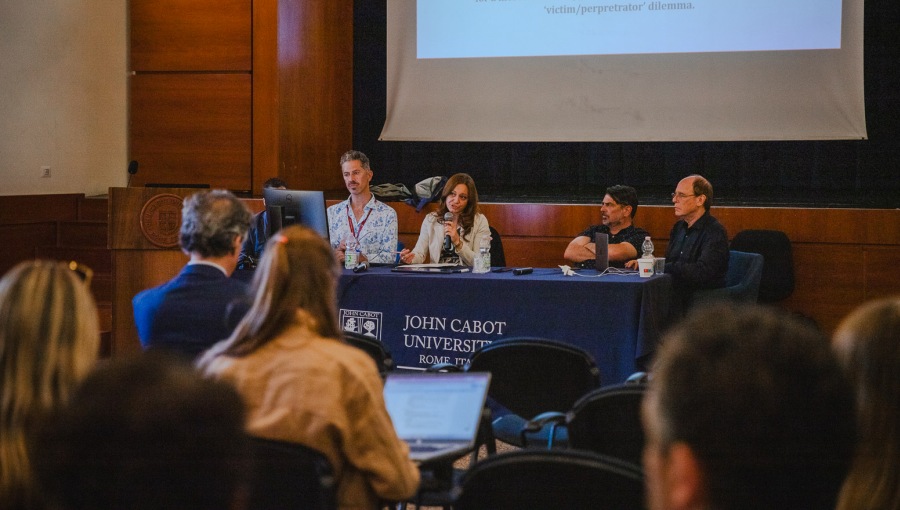Guarini Institute for Public Affairs Participates in Festival della Diplomazia
JCU’s Guarini Institute for Public Affairs co-organized three events in the 9th edition of Rome’s Festival della Diplomazia, entitled “What Makes the World Go Round: Are National States Still in Charge?”
The first event, “Crimea Today: The Human Rights Situation,” was held on October 17 in collaboration with the Embassy of Ukraine to the Italian Republic. The panel discussion focused on the violation of human rights against the Crimean Tatar population, which began after the 2014 Russian military occupation. The speakers, Ukrainian ambassador Yevhen Perelygin and the president of the Festival della Diplomazia Giorgio Bartolomucci, underlined the importance of the discussion of human rights in relation to the specific case of Crimea, but also as a wider theme in international relations.
Professor Federigo Argentieri, Director of the Guarini Institute, gave an overview of the political situation in Ukraine and its relations to Russia, and presented the invasion of the Russian Federation in Crimea as an important diplomatic problem whose solution is unpredictable. Following the presentation of the video “A struggle for survive of the indigenous people of Crimea,” Vincenzo Camporini, the Vice President of Rome’s Institute of International Affairs, talked about the basic principle of territorial integrity, introduced in Europe after the end of World War II and challenged by Crimea’s annexation to the Russian Federation.
Next, Eskander Bariiev, from the Crimean Resource Center, and Zarema Bariieva, from the Center of Political Analysis and Forecasting “Crimea” took the floor. They focused primarily on the violation of freedom, discrimination, and violence that the Tatar people have to endure under the occupation. Bariiev stated that the Russian Federation is openly violating article 12 of the UN Declaration on the Rights of Indigenous People, and the 4th Geneva Convention with its policy of settlement, which forced 50,000 Crimean Tatars to leave their homes. Bariieva illustrated the analysis of the human rights violations in occupied Crimea over the first 9 months of 2018. According to the statistics, most of the victims of illegal detentions, interrogations, and personal data collections are representatives of the indigenous Tatar people and political pro-Ukraine activists. At the end of the presentation, Bariieva claimed that only with a joint counteraction against the violations of human rights, “will we be able to protect not only the indigenous people of Crimea, the Crimean Tatars, but also Europe and the whole world.”
The second event held by the Guarini Institute was the “The Perception of Strategic Threats- from Nuclear to Cyber” on October 24. The main speakers were Trita Parsi, founder and President of the National Iranian American Council and expert in US-Iranian relations and in the geopolitics of the Middle East and Gudrun Persson, Director of the Russian and Euroasia Studies Program at the Swedish Defence Research Agency and expert on Russian Security policy and military thought.
Trita Parsi talked about the Iranian nuclear deal and its importance in resolving tensions with the United States. The nuclear deal was analyzed by presenting the positions of Russia, EU, and China, which were interested in the nuclear issue, and the views of Israel and Saudi Arabia, which were mainly interested in its consequences for the geopolitical balance of the Middle East. According to Parsi, the nuclear deal represented a diplomatic channel between the US and Iran, and after two years of implementation, the Iranians proved their commitment to it. However, given the President Trump’s decision to walk out of the deal, future US-Iran relations and the nuclear issue may depend on US foreign policy toward Israel and Saudi Arabia, and certainly on US domestic policy after the upcoming midterm elections.
Gudrun Persson focused on the new Russian military strategies. After having presented the change in Russian foreign policy caused by the break with NATO, especially after the events in Kosovo, Iraq, and Libya, Persson compared the Russian strategies in the Georgian War and the annexation of South Ossetia with the strategies in the conflict in Ukraine’s region of Donbass. According to Persson, the main difference between the two conflicts was that the Georgian one involved traditional warfare, whereas the conflict in Ukraine was a hybrid and non-linear war, which included cultural and economic elements together with the conventional use of force. Finally, Persson emphasized how Russia is expanding its knowledge in space and cyber warfare, and Parsi stated that the problematic use of space and cyber warfare needed to be addressed under international law.
The third event was a book presentation, held on October25 at Gangemi Editore headquarters in via Giulia in Rome. On the occasion of the 50th anniversary of the Prague Spring, a volume was published with the title Dubcek – Il socialismo della speranza (The Socialism of Hope), which was introduced and discussed by H.E. Jan Soth, Slovak Ambassador to Italy, and Prof. Argentieri. Both speakers emphasized the importance of the Prague Spring for European history and the tragedy of the process of liberalization and democratization being ground to a halt by the military intervention of five Warsaw Pact armies. Additionally, they explained how Dubcek’s charismatic leadership had almost entirely bridged the gap separating the rulers from the ruled, thus implementing the idea of “socialism with a human face.” After the brutal awakening of August 21, 1968, the day the tanks rolled in, another 21 years of oppression followed. Nevertheless, Dubcek had the last word in December 1989 when he was triumphantly welcomed back to Prague along with Vaclav Havel, the chief opposition intellectual: they were elected to the highest state positions after Czechoslovakia’s “Velvet Revolution” against the obsolete and decrepit communist regime brought to power by foreign armies.
(Clelia Casciola)







